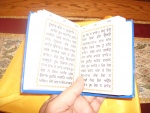Template:AOW380
Bani (Punjabi (Punjabi: ਬਾਣੀ)), short for Gurbani (Punjabi (Punjabi: ਗਰਬਾਣੀ)), is the term used by Sikhs to refer to various sections of the Holy Text that appears in their several Holy Books.
The word Gurbani consists of two roots - Guru and Bani. The word "Guru" means "spiritual teacher" and here refers to the ten Gurus of Sikhism, the other Bhagats and writers whose writings can be found in the holy Guru Granth. The word "Bani" s refers to their utterances and writings. So the combined word "Gurbani" means the writings of the Gurus as found in the Sikh holy scriptures; the Gurus' words; the Gurus' teachings.
These Banis are also found in small Gutkas or Small Books containing sections of Gurbani. These Gutkas can vary from just a few pages to hundreds of pages and are used by Sikhs to refresh the text of the these Banis in their mind on a daily basis. The handy size of the Gutkas makes it easy to carry them in a coat pocket or purse. Although the Gutkas have to be treated with respect and care, the Sikhs do not accord the Gutkas the same reverence as the Sri Guru Granth Sahib their perpetual Guru, which is treated like a living Guru.
Sikhs carry the Gutka covered in a clean cloth and wash their hands before handling the Gutka. You must not put any Gurbani script on the floor; nor handle with unwashed hands; read without covering your head; turn the pages with licked finger; or cause any disrespect to the honourable word of our Gurus. .....More

